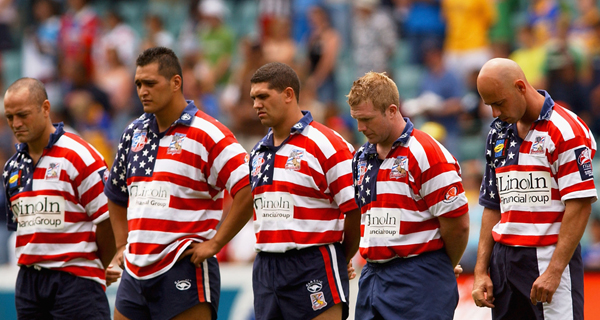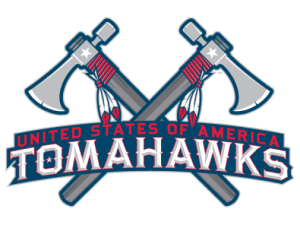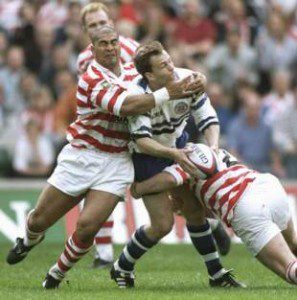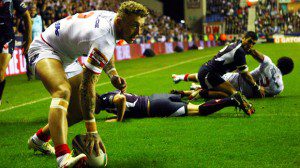
 RWU reader and fellow Rain Man Ryan Day has finally taken us up on an offer to guest author. Here goes:
RWU reader and fellow Rain Man Ryan Day has finally taken us up on an offer to guest author. Here goes:
INDIANAPOLIS, IN – The Rugby League World Cup just finished in England and while League is not as popular as Union on a worldwide basis, it does have its heartlands in Australia, New Zealand, England, and some Pacific Island countries.
The RLWC expanded to 12 teams from its last tournament in 2008, and this expansion allowed for the American national team, the USA Tomahawks, a great chance to qualify. The qualifier was held two years ago in of all places a minor league baseball stadium in Newark, New Jersey and the schedule gave the Tomahawks the maximum time between their games in comparison to their two opponents who each had to play on consecutive match-days. The Americans seized the home-field advantage and defeated a poorly put together South African outfit and a game Jamaican side to take the spot. The traditionally more competitive Canadians were not invited by the RLWC organizers.
This was the single greatest achievement in the history of American Rugby League. However, the entire process up to that qualifier and since has been fraught with political infighting. Of the roughly dozen or so rugby league clubs in the country that can fulfill a season-long match schedule and can field a full team without getting volunteers from their opponents, they split into two leagues over disagreement from some clubs on the running of the league and its ownership.
This disagreement extended to players on the National Team, which was run by the same people that established the American National Rugby League. See, the AMNRL stated it would not pick any players from clubs in the start-up rebel league, the USA Rugby League, and used that threat to encourage player movement to the Tomahawks-affiliated AMNRL. Moreover, it was fine for the Tomahawks to pick players from other countries, players that were not even affiliated to a rugby league club domestically or played domestic rugby union, just as long as they did not play for a USARL club.
 Arguably from a neutral point of view, the USARL had more of the better domestic players, due to having more of the strongest clubs. Internationals playing under this selection policy resulted in poor results for the Tomahawks in games against Canada and Ireland and robbed some of our best domestic players of a chance to develop their skills for the upcoming RLWC.
Arguably from a neutral point of view, the USARL had more of the better domestic players, due to having more of the strongest clubs. Internationals playing under this selection policy resulted in poor results for the Tomahawks in games against Canada and Ireland and robbed some of our best domestic players of a chance to develop their skills for the upcoming RLWC.
The problem is that all of these players are as amateur as the rugby union players you find in the USA… and probably more so for most of them. So just moving to another city -considering family and a job – just for the sake of rugby, is out of the question for most.
The most recent scandal in American Rugby League again touched on player selection in the immediate run-up to this World Cup. This time it was not a league civil war, however. It was over the fact that almost all of the players selected were Australians and Englishmen with minimal ties to the United States making up the large majority of the roster. When you consider that one reason flaunted in domestic players’ faces to choose the AMNRL was that playing in the USARL meant banishment from Tomahawks selection, you can see how a domestic top-end player could feel shafted.
For the “results first” people, the selection is justified by the Americans’ victory over the French in a warmup and then the Cook Islands and Wales. The argument comes down to “The Australians and Englishmen are better.” Once you take the point of view that all that matters is results, it’s a very slippery slope because when you take that tack, why would rugby league in this country even bother trying to generate interest or participation in the game domestically, if they can always get a bunch of Australians and Englishmen? There’s no money in putting time and effort into domestic rugby league at this point: you’re doing God’s work for no financial reward.
 How does all this help U.S. Rugby League grow? Comparing League to Union in The States, American domestic rugby union is many years ahead of rugby league in terms of grassroots development. Then there’s the issue of American Rugby League post-RWLC. What does U.S. rugby league do in 2014, 2015, 2016? This RLWC was either not being broadcast in the U.S. or was on a channel that no one knows they get.
How does all this help U.S. Rugby League grow? Comparing League to Union in The States, American domestic rugby union is many years ahead of rugby league in terms of grassroots development. Then there’s the issue of American Rugby League post-RWLC. What does U.S. rugby league do in 2014, 2015, 2016? This RLWC was either not being broadcast in the U.S. or was on a channel that no one knows they get.
What is for certain is that for future internationals, you just pissed-off the best rugby league players in this country. This is no slight against the players on the team but if you asked them what state they were from, they would answer “New South Wales.” They gave an honest effort, performed well and beyond expectations and they likely see this as an opportunity to play fun rugby without the pressure that comes with their regular rugby job. I doubt there’s a lot of money in playing for the Tomahawks in the RLWC. But do you expect these guys to fly from Sydney to play against Jamaica in Newark next year for no pay? These are the questions that these selections must bring into context and find answers for.
I don’t believe in quota systems though. If anything, this is more an indictment on how loose the eligibility rules of the Rugby League International Federation are. The reason for the loose eligibility is to show “other people play this game too” by putting in some ringers, hoping it will generate greater interest in the game elsewhere. If they want to grow American Rugby League, Americans are not going to cheer for Australian rugby leaguers representing us, for the same reason Australians are not going to cheer for American baseballers representing Australia… like in the World Baseball Classic.
Major League Baseball are part owners of the Australian Baseball League, the 2014 baseball season is opening with a doubleheader at the Sydney Cricket Ground, and Major League Baseball wants to develop Australian fan interest in the sport as well as Australian baseball talent. To tie this into American Rugby Union, the Eagles also have a few guys that are Americans by convenience. There’s the crew of American Samoans who only recently have been able to choose to represent that territory in international play.

If those guys (a collection of internationals) go out and lose to the England Saxons 87-8 as happened a few years ago, it’s a sign we’re doing a bad job and we need to improve so we can produce a sustainable assembly line of quality international rugby players in this country, not a sign we need to comb through English Championship rosters.
Thanks for your time reading this post/rant… feel free to comment below, look for and “Like” our Facebook Rugby Wrap Up Page and follow us on Twitter @: RugbyWrapUp, Junoir Blaber, DJ Eberle, Nick Hall, James Harrington, Cody Kuxmann, Jaime Loyd and Declan Yeats, respectively.

